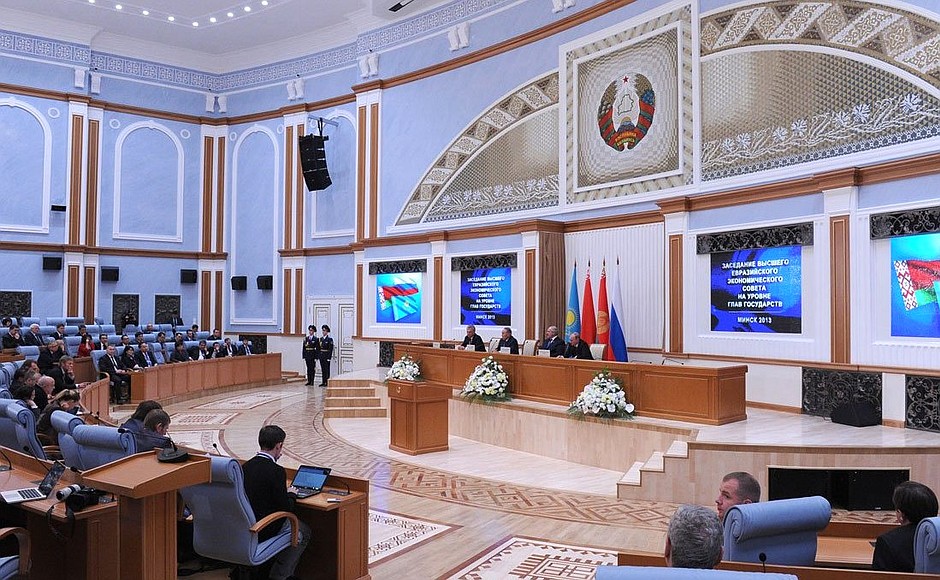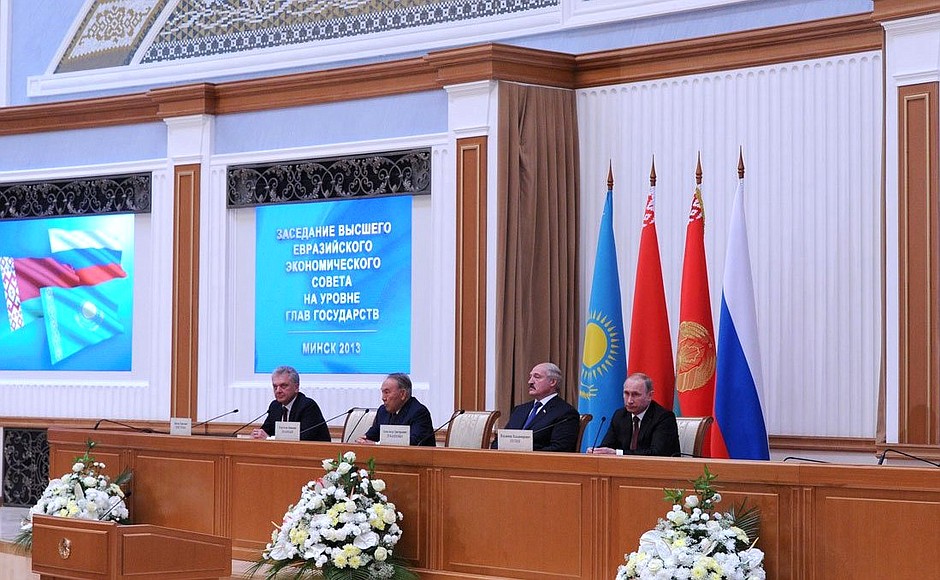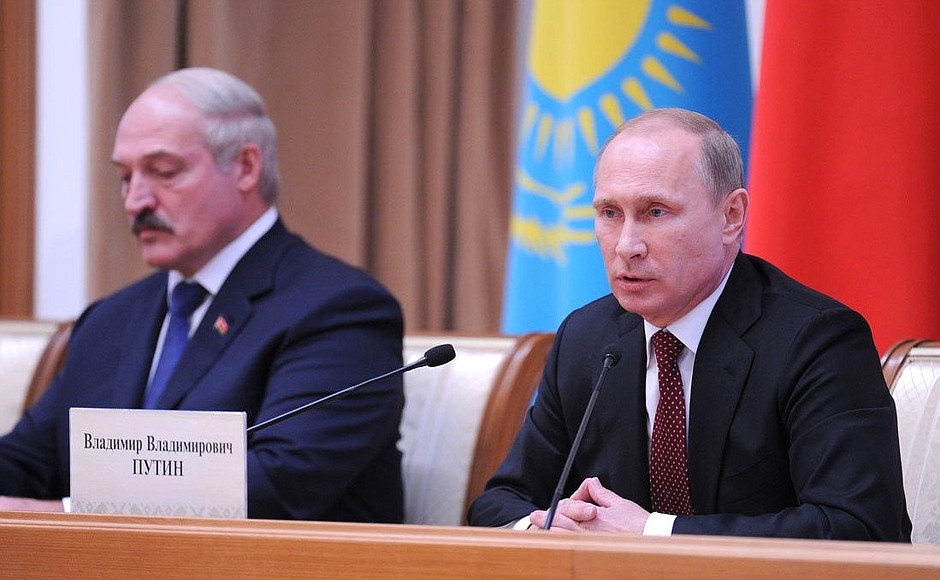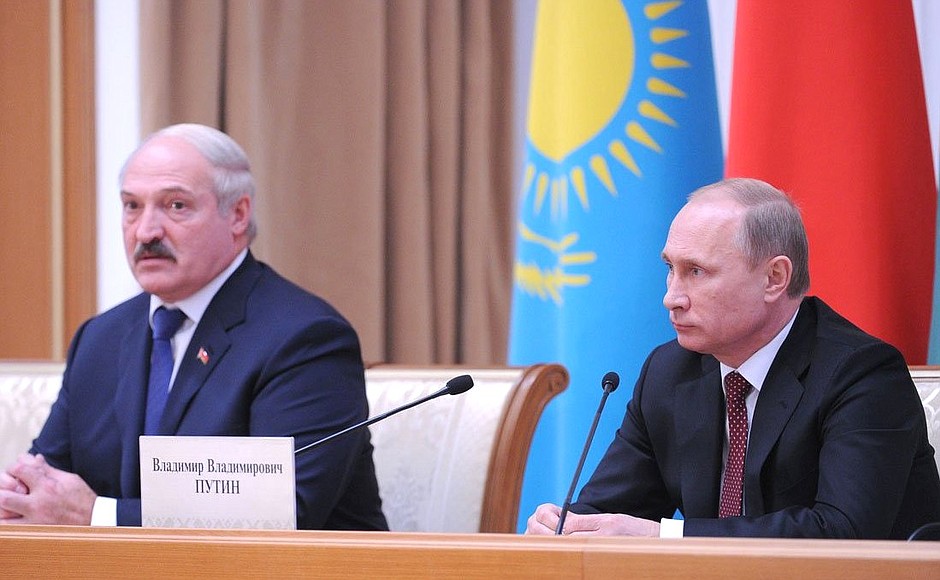President of Belarus Alexander Lukashenko: Friends,
The Supreme Eurasian Economic Council has just held its summit meeting here in Minsk.
We examined in a constructive spirit the current issues shaping our future integration prospects. In particular, we examined the whole package of issues concerning the treaty on the Eurasian Economic Union, and together approved concrete instructions for our governments on further work on the draft treaty.
We looked at issues concerning the model law on competition, procedures for the movement of narcotic and psychotropic substances in the Customs Union, execution of the Eurasian Economic Commission’s budget and other matters.
Let me say that the discussions that went on over the first issue were intense, but we settled the unresolved matters regarding the treaty, came to a unanimous view, and approved the relevant decisions. They are not secret and you can see for yourselves what has been decided.
The decisions we took reaffirm the unwavering commitment on the part of the Customs Union and Common Economic Space members to continue the integration process. The leaders of the three member countries were joined at this summit meeting by our invited colleagues, the presidents of Armenia, Ukraine, and Tajikistan, and representatives of Kyrgyzstan.
We looked at deepening the cooperation between the three member countries and Armenia, which has expressed the desire to take part in the Customs Union and the Common Economic Space, and with Ukraine, which has stated its intention to sign an association agreement with the European Union. All questions raised by Armenia and Ukraine concerning the Customs Union, Common Economic Space, and the future Eurasian Economic Union were examined here and received full, honest and open answers. We welcome their desire to join the Customs Union. These are important matters that will have a big influence on developing trade and economic relations throughout the region.
Right from the earliest stages of the integration process, we have consistently followed the view that integration in the post-Soviet area brings unquestionable benefits for those taking part, and ultimately for ordinary people, our countries’ citizens.
We are not closing our group’s door to anyone, and if someone shuts it of their own accord, this would be an unnatural thing to do. Our people have too many common bonds to close ourselves off from each other. Our integration group is open to other countries that share its aims and are willing to take on its obligations.
Today, the Common Economic Space is a huge market with a large number of consumers. It offers big opportunities for industrial cooperation, carrying out investment projects, and innovative development.
Our integration project’s success has prompted other countries such as Vietnam, New Zealand, and the countries in the Free Trade Association to conclude free trade agreements with the Customs Union. The President of Russia spoke today about the interest that India, Israel and other countries and economic groupings are showing in our project.
See also
Mr Nazarbayev said that Turkey is also studying closely the situation with our Customs Union. It is clear that it is a lot easier to overcome the crisis situation in the global economy if we are together.
We support a more active integration process in the post-Soviet area and we see integration as a powerful driving force for our country’s dynamic development.
Thank you for your attention.
President of Russia Vladimir Putin: Colleagues, ladies and gentlemen,
Today’s talks were extensive and substantive. We set forth new benchmarks for developing Eurasian economic integration, and confirmed our strategic course toward closer commercial cooperation, trade and investment ties.
The heads of the three Customs Union nations agreed to move toward fully eliminating the current exemptions and limitations from the overall structure of the Customs Union and the Common Economic Space. This means we will remove all remaining barriers to the free exchange of goods, services, capital, technologies and labour.
We have finished codifying the legal framework of the Customs Union and the Common Economic Space. We are also in the process of finalising the text of the Eurasian Economic Union Treaty.
We have a general sense that the Union should pursue a balanced macroeconomic and fiscal policy. We also plan to cooperate more tightly on issues of employment and infrastructure development, including the creation of Eurasian transport and energy networks.
The three current Customs Union nations are giving a great deal of attention to issues of creating a common high-tech product market and improving the investment and business climate, which should directly contribute to increasing the efficiency of our national economies.
Sustainable growth is inextricably tied to developing competition. Thus, we have approved a corresponding model law. It is aimed at bringing legal regulation in Belarus, Kazakhstan and Russia’s competition policy closer together.
Real achievements in Eurasian integration are eliciting increased interest among our CIS partners and other nations around the world. President of Belarus Alexander Lukashenko just spoke about this.
We supported Armenia and Kyrgyzstan’s intention to join our integration project. We have agreed to create a working group whose goal is to prepare a corresponding roadmap as quickly as possible.
And in conclusion, I would like to thank my colleagues for a constructive discussion. Naturally, I have special words of gratitude to our hosts for organising this meeting and this work. And of course, it was truly our pleasure to work in such interesting premises adapted for this type of work at this level. I think it is very convenient here. I would like to thank our hosts for this.
Thank you very much.
President of Kazakhstan Nursultan Nazarbayev: My colleagues have just briefed you on the results of our discussions.
We agreed that we will move towards signing the treaty establishing the Eurasian Economic Union, which will begin work on January 1, 2015. To do this, we need to have the draft treaty ready for signing by May next year, so that there will be time for the national parliaments to ratify it over the next six months. This was the main task, and the first document, comprising two parts, was the main subject of discussion.
We reviewed the Customs Union’s results so far, noted its achievements and also looked at losses caused by drops in reciprocal trade as a result of falling global export prices. We had a serious discussion about the fact that the agreements we have signed regarding provisions applying to our common market are not always carried out in full by the relevant regional bodies. Our commission, headed by Mr Khristenko, will need to work on these problems.
This is an important organisation and we treat it very seriously. This is the biggest integration undertaking in the post-Soviet area. Each country enters it because it sees that there are issues that it cannot resolve on its own and that must be resolved together, and in the integration group it finds relations on an equal footing, and reciprocal benefits to be gained. Only in this case can integration work be viable.
We are therefore very cautious in our approach to taking in new members. The working group first needs to study the economic level in the prospective member country, the level of reforms that have been carried out, and how well suited our economies are to each other in integration terms. We have therefore set up a working group for Kyrgyzstan and Armenia, and will draw up a ‘roadmap’, which we will then use.
Finally, Kazakhstan wants to conclude its negotiations on joining the World Trade Organisation, but some problems have come up, and this also something that we discussed today. In the end, we came to agreed decisions on all of the important matters and will move forward from here. Thank you.
Alexander Lukashenko: Friends, we have made our statements.
I want to inform you that we have also decided on holding our concluding talks in this same format. The meeting will take place in Moscow in December, as was agreed earlier. This will be our third meeting in this format, and we invite all of the journalists to attend too.
On behalf of the presidents, I want to thank the experts and representatives of the Customs Union and Eurasian Economic Community member states who took part in preparing this meeting and preparing the documents that served as the basis for our decisions today. Thank you very much.
To make things properly democratic, maybe we forgot to say something or did not give enough clarification, so if there are any questions, we will answer them now. We could take a question from each country at least.
Question: A question for the presidents of Russia and Belarus.
Russia has stated many times, and Mr Putin also confirmed this today, that it is prepared to build the Eurasian Economic Union without any exemptions or limitations. Take, for example, a position like oil or petroleum products: yes, we are prepared, but if our partners also make concessions on sensitive positions. And now, the Russian press is actively discussing the possibility of cancelling export tariffs for petroleum products, but with a simultaneous, commensurate increase in taxes on oil extraction. Won’t this mean that Russia’s concessions will be less significant than those of Belarus and Kazakhstan?
Vladimir Putin: Why are we talking about concessions? We are talking about seeking a balance of interests. And a balance of interests means that if we eliminate the exemptions you spoke about (and this is a very important question) from our customs rules within the framework of the Customs Union, then they must all be eliminated. In any case, if we move in that direction, we must do it in a balanced manner and take into account each other’s interests.
We understand that it is important for our partners to leave out exemptions pertaining to petroleum products, oil, etc. We are ready. This will mean a loss of income for us, but we are prepared to do it. But we expect that our partners will also meet us halfway, removing exemptions that are important for them. This requires a certain amount of time.
Today, Mr Nazarbayev proposed a formula; our Kazakhstani partners suggested that we coordinate timeframes with certain deadlines and move toward resolving the issue of these exemptions. We agreed; we feel that this is a reasonable, professional approach.
Alexander Lukashenko: Yes, indeed, a question was raised at some point about exemptions and limitations: what is this Common Economic Space, and moreover, this Eurasian Economic Union, if it involves a ton of exemptions and limitations? And, in our restricted format meeting (but this was no secret, it was made public), Mr Putin said that yes, like you, we are prepared for exemptions and for working without limitations, if all the partners agree. This is an equitable way to address the issue.
I must say that Mr Nazarbayev suggested a kind of timeframe for this process. I said this today as well: Belarus is now ready to work without exemptions or limitations. Yes, it means increased competition in certain sectors. But if we demand and request that our partners agree not to have those exemptions, then we must take corresponding steps. We confirmed our position word for word, and in this case, we will not demand any kind of timeframe for adapting to any particular issues. So we will quickly make decisions that will satisfy the Russian Federation, our friends in Kazakhstan, and Belarus.
Question: Mr Nazarbayev, my colleagues and I listened carefully to what the three Customs Union states’ presidents said at the restricted meeting about the trade barriers, problems of goods being accessible in Customs Union nations. And now, you and Mr Putin are talking about a resolution. We would nevertheless like to know about concrete instructions. What will the Eurasian Economic Commission begin working on first, in overcoming these problems?
Nursultan Nazarbayev: I already said in my speech that we have adopted documents – treaties and documents – and want these treaties to be carried out. You just heard that we have the issue of oil, petroleum products, gas products and oil pipelines. Naturally, Russia is the largest of our nations and will have the greatest expenses. But in spite of this, we are working together. There are economic issues, and there are obstacles to the movement of goods like phytosanitary issues, laboratory tests under various pretexts. Our businesspeople complain about it, and we have issued instructions to get to the bottom of this.
Moreover, we are dealing with the following issue. Recently, Kazakhstan and Belarus have been exporting three to four times less into Russia than Russia is exporting into our nations; in other words, our trade is not balanced. This issue exists throughout the world, it’s not something to worry about. Here, we need to work together, to develop joint companies. Again, this happened because the price of energy resources and mineral resources that we supplied to one another went down. These issues need to be resolved.
Russia says, “We will resolve all the issues, and so will you.” To be honest, what we mean is that you will open up services to us – in other words, allow huge Russian banks to come and work in Kazakhstan; you will open the skies for planes to pass there; you will open other existing issues. But the problem is that the financial systems are different in different nations. I know Kazakhstan has an advanced financial system, but we also have a pension system and an insurance system, so our Eurasian Commission must choose the best example. If the Belarusian or Russian practices are better, we must follow that path, and not pull the government back from reforming. And in order to do that, we need a gradual transition. Today, we wrote the following phrase in our Treaty: gradual transition to services. First we will resolve the main matters, and then gradually resolve issues with services.
Question: A question for President Putin. Please answer as concretely as possible: are you for or against Ukraine signing the association agreement with the European Union?
Vladimir Putin: We are not for or against it. That is none of our business. It is the sovereign right of the Ukrainian people, the Ukrainian leadership represented by the President, Parliament and Government.
Question: Then please answer directly. After signing this association agreement, would it be possible for Ukraine to join the Customs Union? And if not, then why?
Vladimir Putin: No, it would not be possible. It would be impossible because that association assumes the creation of a free trade zone between the European Union and Ukraine. Within the framework of that zone, Ukraine takes on the responsibility to implement the European Union’s trade rules and trade policy within its territory.
Of the approximately 10.5 thousand existing import customs tariffs (I might get the exact figure wrong), 7,666 tariffs would be eliminated the moment the agreement comes into force, and it could come into force as early as the beginning of next year, sometime around February. In the next three years, the market would be about 85.5% open, and several years down the line, 98.5% open. We feel that this kind of open market is very dangerous for us; it is unacceptable at today’s stage of our economic development.
I have already said many times that we are striving to create a common Eurasian Economic Space, from Lisbon to Vladivostok. But in order for this to occur on an equitable basis with equal rights, in a way where we do not incur any economic losses and, as a result, losses in the social sector, this needs to be harmonised gradually.
And the following question occurs: as we know, Ukraine is required to implement the European Union’s technical regulations within its territory. This is a very important issue. What does this mean for people who are not experts in these issues? It means that nearly all the goods, or many of the goods produced in Ukraine, must meet the European Union’s technical standards. These are good technical regulations – very good ones. But in order to release goods that meet them, one must modernise the economy and various manufacturing sectors. This requires major investments: around 100 billion euros, according to our expert assessments. Are these resources available?
After all, when a nation becomes a full-fledged member of the European Union, it receives loans, certain benefits, etc. But Ukraine is not joining as a full member, and I don’t think there are any loans or any sort of benefits for it.
In our opinion, we believe this can lead to the displacement of Ukrainian goods to other markets, first and foremost, the Customs Union market. And if we assume that we have a free trade zone, and Ukraine and Russia are both members of that zone, then this will certainly lead to displacement onto our market. So we retain the right to use protocol No. 6 of the free trade zone agreement, in order to protect our market.
This does not mean we will forbid the import of Ukrainian goods into the Russian market. But it does mean those goods will not benefit from preferential conditions within the free trade zone, although they will be subject to the so-called “most favoured nation” regime. In other words, goods produced in Ukraine will be categorised in the same way as all other WTO member states.
We also looked at another issue. Today, I briefed my colleagues. One of the provisions states that goods whose final assembly occurs on Ukrainian territory will be considered of Ukrainian origin, even if part and units are produced in EU nations. This is called CKD assembly. And we do not want to have CKD assembly located on a large scale in our territory. What we have been seeking from our partners and what we have nearly achieved is that if, for example, we are implementing joint engineering projects, then those projects have to be deeply localised – 60–70% localised. And we agreed on this. All our main global partners or global brands are working in the automotive industry. We do not want to receive some kind of “gift” through the back door in the form of a “screwdriver.” We need to consider this as well. And incidentally, this can significantly complicate our cooperation in such high-tech sectors as aviation, aerospace, shipbuilding, and engineering overall.
And finally, with regard to agriculture. Ukraine has essentially agreed to fully open and liberalise its agricultural product market. This pertains to animal husbandry, importing livestock, and meat production. It also concerns crop production, because in addition, as we can see from draft documents, Ukraine has agreed to switch over to the European Union’s sanitary and veterinary rules. These issues are all subject to very difficult, substantive negotiations. We are not participants in those negotiations and cannot just suddenly take it all on and transfer it over to Russia.
So today, Mr Yanukovych and I have agreed that we will certainly hold consultations with our Ukrainian partners in accordance with the rules set forth in the tree trade zone agreement, but we reserve the right to take protective measures, which I already mentioned.
Alexander Lukashenko: Thank you.
Friends, thank you very much. Have a great dinner. See you tomorrow. Thank you.



